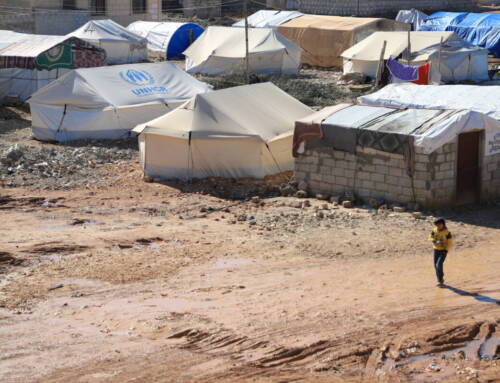Water completely cut off in north Homs town with no end in sight
“I just want to die, and take a break from […]
26 January 2017
“I just want to die, and take a break from this life,” Umm Yousef’s 12-year-old son told her after he unsuccessfully tried to kill himself by swallowing the contents of a pill bottle.
It wasn’t complicated, the boy told his mother. “There’s nothing here—no water, no food.” He will try to kill himself again, his mother, Umm Yousef, tells Syria Direct’s Bahira al-Zarier, “and he said next time we shouldn’t bother saving him.”
Umm Yousef, her disabled husband and their nine children live in the once-affluent town of Rastan, located in a pocket of northern Homs that remains under rebel control. Syrian regime forces encircled the town in 2014.
Rastan’s 100,000 residents have lacked affordable, consistent water access for seven months, since USAID contractor Chemonics International suspended water subsidies and other projects in June 2016, citing corruption on the part of the recipient Homs Provincial Council, a charge the opposition-run council denied, officials told Syria Direct at the time.
Though not the only organization that provided funds to the opposition-run Homs Provincial Council, Chemonics was one of the largest before suspending its two-year, $800,000 contract last June.
Three weeks ago, the local opposition council that runs the north Homs countryside ran out of diesel fuel. Aid organizations had no more fuel to donate. Water pumps ground to a halt, and the region has been completely cut off since then.
“We appealed for aid again recently, but this may be our last chance at a solution,” , says Rastan Local Council President Yousef Darwish, just days after the council posted an urgent plea for “humanitarian aid” on Facebook.
“I brought my request for water aid to the Homs Provincial Council, but they responded that they had no ability to help at the time,” Darwish says. “As president of a local council, this is the extent of what I can do.”
Umm Yousef, 45, is a mother of nine living in Rastan. Her husband is physically disabled and cannot walk or work, leaving her in charge of securing water for the entire family.
Q: Tell us more about your situation. How do you manage to provide water for your family?
Water is essential to life. Though it’s a daily need for everyone, we’ve only received it every two weeks for the past several months, for only one hour at a time. To make things worse, I have nine children and my husband is disabled, unable to work.
Sure, there are water tanks available, but I can’t buy one because I don’t have enough money—a 1,000-liter tank costs around SP700 ($3).
As a result, my children haven’t taken a bath for a month. Thank God for the rain, though. When it rains, we put pots and pans outside to collect drinking water, which my children are now begging me for.
Q: You have nine children to support on your own. How are they coping with the water shortage?
My 12-year-old son tried to kill himself recently. He told me: “There’s nothing here—no water, no food. I just want to die, and take a break from this life.”
He swallowed an entire bottle of pills. When he regained consciousness, he told me he would try to kill himself again, and he said next time we shouldn’t bother saving him.
We need water here, and nobody is stepping up to support us. God help us.
**
Yousef Darwish is an engineer and the president of Rastan’s local opposition council.
Q: When did the water pump go out of service? As a local council, do you have any available alternatives for providing water to Rastan?
Two months ago, the water flow to Rastan began cutting off. We have no easy way to get diesel to run the pumps, so for the past two months, we’ve relied on donors for water.
Before, various aid organizations would provide us with enough diesel to operate the water system every three days, but now we’ve run out of options and we are sending out urgent appeals for help, in the hopes that someone will respond.
Q: If aid organizations fail to respond to the need for water, what will the impact be on residents of Rastan?
Without any help from aid organizations, the situation in Rastan will worsen a great deal. In addition, the war and bombings have pushed residents into poverty—yet another burden that residents must bear as they flee their debts.
We appealed for aid again recently, but this may be our last chance at a solution because we feel completely unable to pump water back to Rastan.
Q: How did the aid organizations previously provide help securing water? Why did they stop providing aid?
Various aid organizations provided funding for the water pumps to operate for different periods of time, ranging from several days to a month. The only reason they stopped was because their projects ended.
Q: Have you communicated with the opposition government to request support for Rastan’s water network? What was their response?
I brought my request for water aid to the Homs Provincial Council, but they responded that they had no ability to help at the time. As president of a local council, this is the extent of what I can do.







